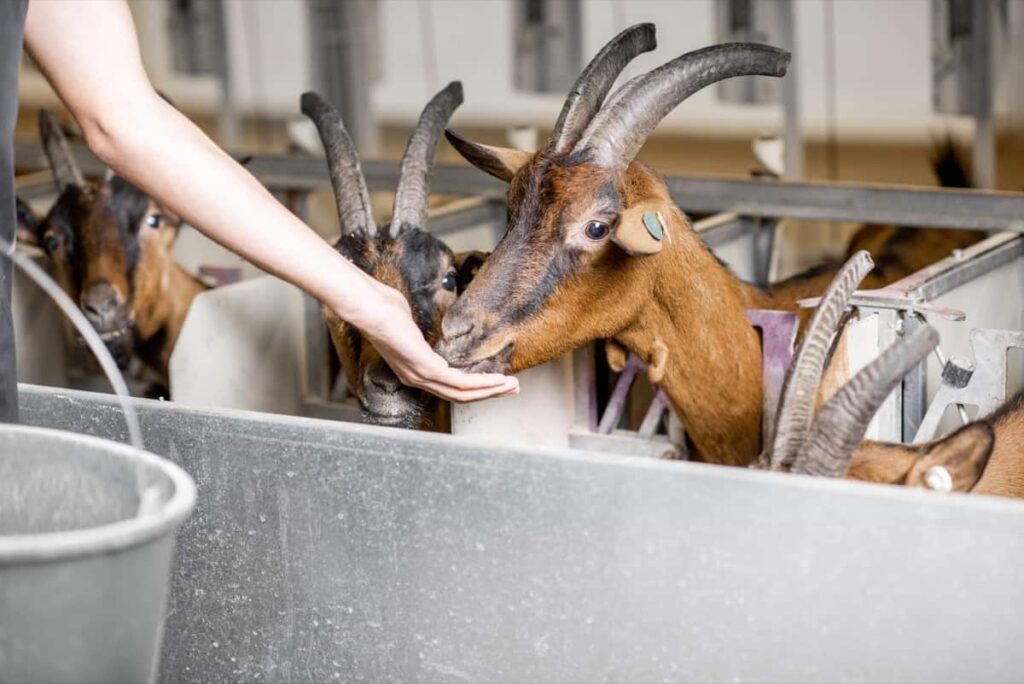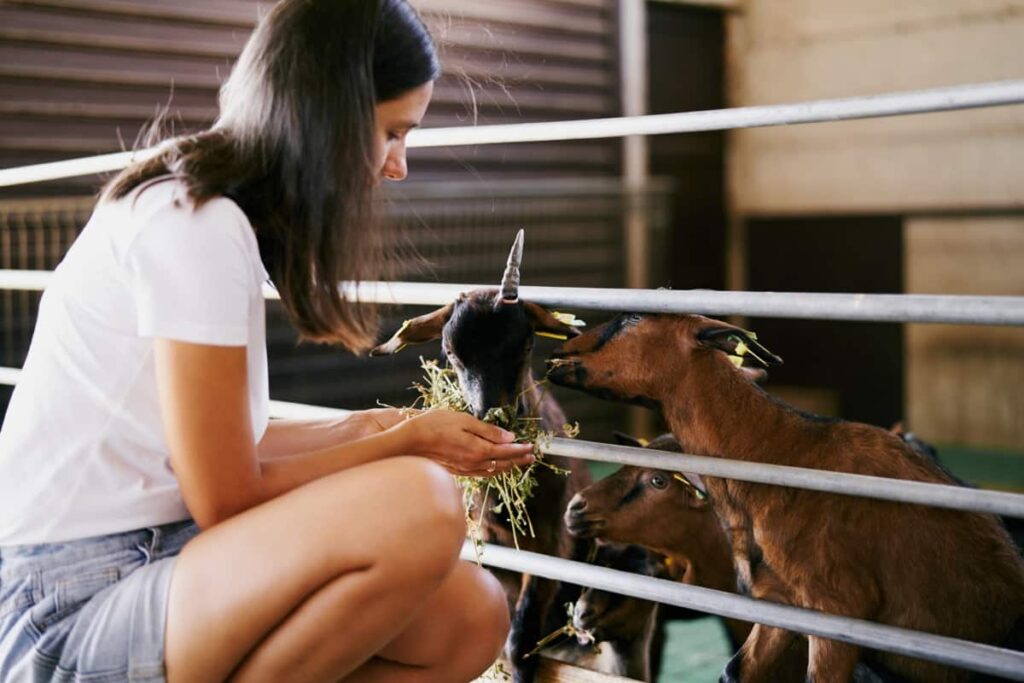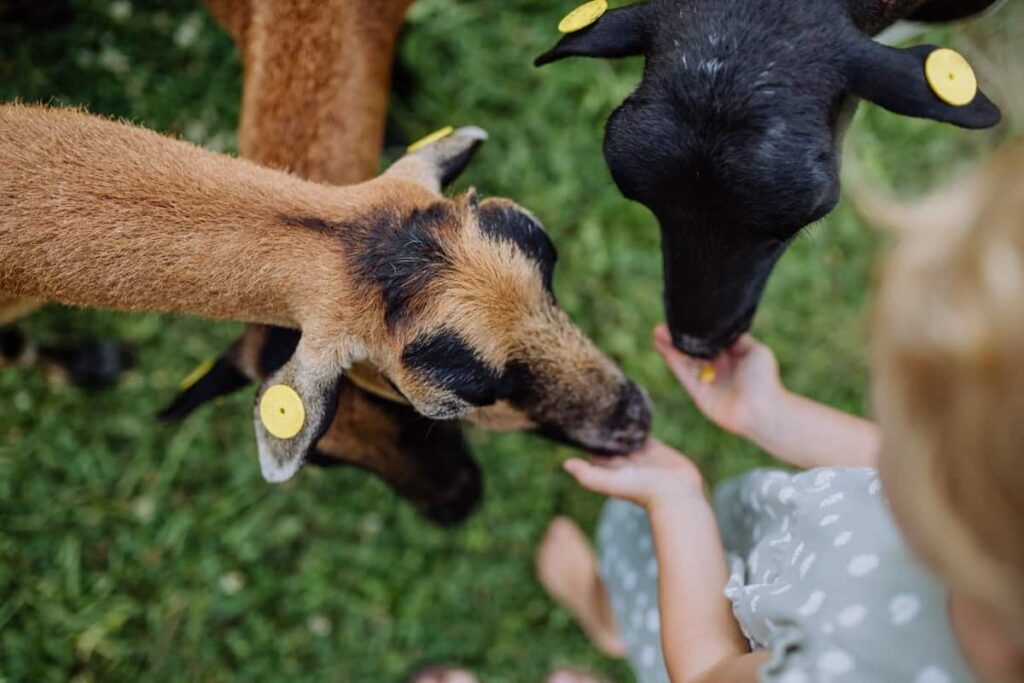Proper goat feed management is essential for their health and productivity. Just like humans, goats require a balanced diet that provides them with all the necessary nutrients. Goats are ruminants and must eat hay, fresh produce, and other supplemental feed to digest their food properly. Proper feeding can help increase milk production.

Importance of Balanced Rations in Goat Feed Management
- Balanced rations are crucial in goat feed management, providing the nutrients for optimal growth and production.
- Proper feed management also helps reduce feed wastage which ultimately translates into cost savings for farmers.
- It is important to note that an unbalanced diet can lead to undernutrition or over-nutrition, which may cause health problems like metabolic disorders, reduced milk yield, or weight loss. Farmers must ensure their feeds are carefully formulated to avoid this scenario, focusing on nutrient balance rather than providing energy-rich diets.
- A balanced ration helps maintain good health and increases productivity by promoting efficient feed utilization.
Different Types of Goat Feed
- Goats are ruminant animals, which means they have a unique digestive system that allows them to digest tough feeds such as hay and grass. In addition, goats require a balanced diet that meets their nutritional requirements.
- There are several different types of goat feed available in the market. One type is pasture or forage, which includes fresh grasses and legumes like alfalfa. This type of feed is essential for the animal’s health and development.
- Another type is roughage, which includes hay or straw. Roughage provides fiber to help maintain healthy digestion in goats.
- Concentrate feeds are also important for goats, providing additional nutrition such as protein, vitamins, and minerals.
- Supplements can also be added to ensure that goats meet nutrient requirements, including salt licks which provide necessary minerals such as calcium and phosphorus.
Selecting the Right Goat Feed
- It’s important to consider the age and weight of your goats, as their nutritional requirements will vary depending on these factors. Additionally, you’ll need to account for the breed and whether they are lactating or pregnant.
- Next, you should choose a feed that meets their specific dietary needs. For example, mature goats require a diet high in fiber, while young kids need more protein-rich feeds.
- Consider your budget when selecting goat feed options. While investing in high-quality feeds may cost more upfront, it could save money in vet bills down the line by keeping your goats healthy and thriving.
Nutrition Requirements to Keep Goats Healthy
- Goats are ruminant animals, meaning they have a complex digestive system. Their feed requirements depend on their age, weight, and physical activity. Generally speaking, goats need a balanced diet that contains carbohydrates, proteins, fiber, vitamins, and minerals.
- Protein is essential for goats’ growth and milk production. Good sources of protein include alfalfa hay and soybean meal. Carbohydrates provide energy to the animal’s body. Corn and oats are common sources of carbohydrates in goat feeds.
- Fiber is important for proper digestion in goats as it helps keep their digestive tract healthy by preventing bloating or constipation problems. Therefore, hay should always be included as part of their daily ration.
- Vitamins help regulate metabolic processes in the animal’s body, while minerals are necessary for bone development, among other things.
- Water is also critical to good health in goats since it aids digestion and prevents dehydration, especially during hot weather conditions.
In case you missed it: A Guide to Small-Scale Rural Goat Farming: Tips, Tricks, and Best Practices

Managing Fodder Crops in Goat Farming
- Managing fodder crops is one of the most important aspects of goat feed management.
- When planting fodder crops, it is important to consider factors such as soil quality, climate, and the specific nutritional needs of your goats. Commonly planted fodder crops include alfalfa, clover, and ryegrass. Overgrazing or underutilizing can lead to nutrient deficiencies in your goats’ diets.
- Rotating pastures or implementing controlled grazing practices may be necessary to avoid overgrazing. This allows grasses time to regrow between grazing and prevents depletion of nutrients from the soil.
- Proper management of your fodder crops ensures that your goats receive high-quality feed throughout the year while promoting overall health and productivity within your herd.
Common Diseases Related to Poor Nutrition in Goat Farming
- Maintaining optimal nutrition is crucial in preventing diseases in goats. Poor nutrition can lead to various health issues, including metabolic disorders and deficiencies that can cause significant problems.
- One common disease related to poor nutrition is ruminal acidosis, which occurs when the pH levels in the goat’s rumen become too low due to an excess intake of carbohydrates. This condition can result in bloating, diarrhea, and even death if left untreated.
- Mineral deficiencies such as copper deficiency can also occur due to improper feeding practices. Therefore, it is important for farmers always to provide adequate feed containing all required components for optimal growth and well-being while keeping them free from disease-related malnutrition-related conditions.
Common Feeding Mistakes to Avoid in Goat Farming
- One of the most common feeding mistakes to avoid is overfeeding goats. Overfeeding can lead to obesity in goats, which can cause health problems such as joint issues and heart disease. It’s important to provide the right amount of feed depending on your goats’ age, weight, and activity level.
- Another mistake many goat owners make is inadequate roughage in their diet. Roughage is crucial in keeping the goat’s digestive system healthy by promoting gut movement and preventing blockages. Ensure your goats have access to good-quality hay or pasture at all times.
- Feeding moldy or spoiled feed can also be detrimental to your goats’ health. Moldy feeds contain mycotoxins, harmful toxins produced from fungi growth on grains, hay, or silage. These toxins can cause serious health problems like liver damage if consumed by your livestock animals.
- Not providing enough water for your goats is another feeding mistake you should avoid at all costs. Goats require ample amounts of clean drinking water daily.
How to Store Goat Feed?
- Storing goat feed is an essential part of managing their nutrition. One must be careful when storing the feed as it can easily get spoiled or contaminated, rendering it unfit for consumption by your goats.
- The first step in storing goat feed is to make sure that you have a dedicated storage space that is clean and dry.
- It’s also important to store different types of feeds separately. For example, hay should be stored separately from grains and supplements as they require different storage conditions.
- It’s best to keep hay off the ground using pallets or shelves so air can circulate them better. It would help if you also covered the stacks with tarps or other protective covers to protect them from rainwater and wind damage.
- Use airtight containers like plastic bins with lids that snap shut tightly for grain-based feeds and supplements. Store these containers on shelves away from direct sunlight exposure since heat and light can cause spoilage over time. Properly storing goat feed helps ensure your herd has access to high-quality nutrition all year round.
In case you missed it: Best Practices for Disease Prevention and Management in Goats: Strategies for Maintaining a Healthy Herd

Conclusion
Proper goat feed management is crucial for your goats’ overall health and productivity. Feeding strategies such as managing fodder crops and using supplements and minerals can also help improve your goat’s nutrition intake. Roughage plays an important role in maintaining healthy digestion in goats too.
- Goat Milking Practices and Equipment: A Beginner’s Guide
- Goat Farming for Fiber: Producing Mohair and Cashmere
- Maximizing Goat Milk Production: Tips for Dairy Goat Farmers
- Goat Farming as a Family Business: Strategies for Success
- Profitable Kenya Goat Breeds for Commercial Dairy and Meat Business
- Unlock the Secrets of Oberhasli Goat: Discover Raising and Management Practices
- Ultimate Guide to Myotonic Goats: Explore Profile to Raising
- Unlock the Secrets of Rove Goat: Discover Management Practices
- Ultimate Guide to Malwa Goat: Explore from Origin to Management Practices
full of information
Hello Reddy Garu,
I am writing this from Rajahmundry. I want to set up Goat farm in our village and breed Black Bengal goats. Could you please suggest from where I can get best quality Black Bengal goats. Initially I would like to purchase upto 25+1 units.
Eagerly looking forward for your reply and support.
Best regards
Satish
Hey,
I am new to goat farming. I need some help regarding how to prepare goat feed mixture.
There mainly I need some help on the weight of cereals to mix for their food well.
Your kind attention in this regard is highly appreciated .
Thank you.